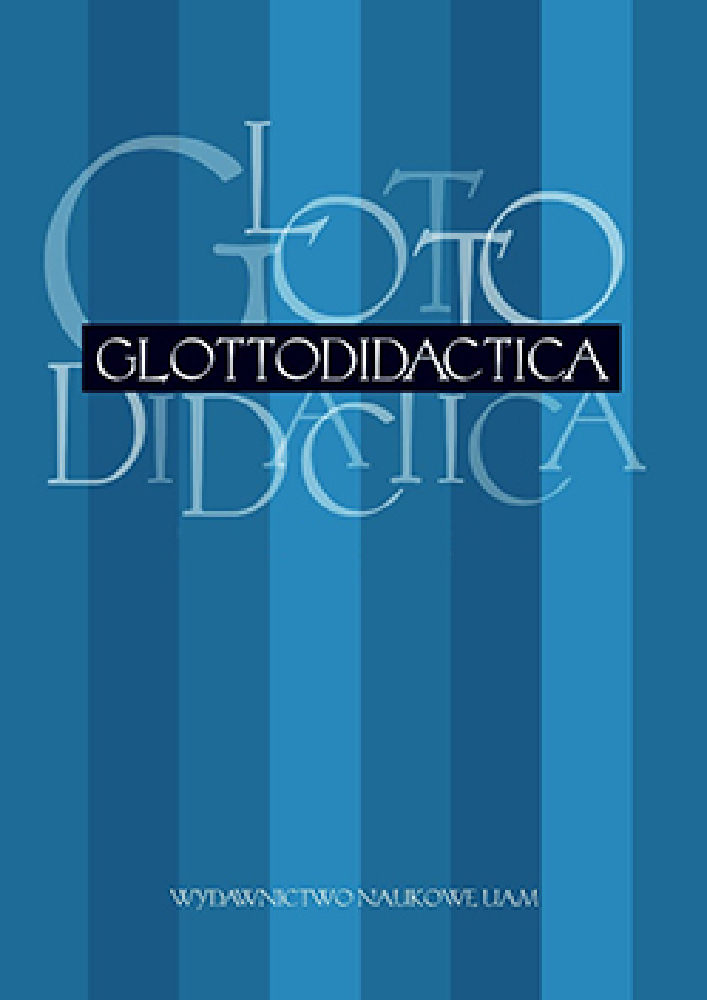Abstract
Children's literature is undoubtedly a very useful tool in teaching and learning foreign languages and its educational value is remarkable. Storybooks contain rich and authentic examples of the language being learned, they involve children personally and actively in the process of language learning and they address the issues relevant to children’s interests and their perception of the world. The aim of the article is to show how children's literature can be used effectively in teaching a foreign language.References
Apeltauer, E., 2004. Oralität, Literalität und Medienkompetenz. In: Badstübner-Kizik, C., Rozalowska-Żądło, R., Kniszewska, A. (Hrsg.). Sprache lehren, Sprache lernen. Festschrift für Prof. Halina Stasiak. Gdańsk: 147-167.
Beirat Frühes Deutsch, 2011. Arbeit mit authentischen Texten. Möglichkeiten und Grenzen für den frühen Fremdsprachenunterricht. In: Frühes Deutsch. Heft 22, 4-5.
Biechele, W., 2010a. Literatur. In: Barkowski, H., Krumm, H.-J. (Hrsg.). Fachlexikon Deutsch als Fremd- und Zweitsprache. Tübingen–Basel: Francke, 202.
Biechele, W., 2010b. Literaturdidaktik. In: Barkowski, H., Krumm, H.-J. (Hrsg.). Fachlexikon Deutsch als Fremd- und Zweitsprache. Tübingen–Basel: Francke, 203.
Bleyhl, W., 2000. Fremdsprachenlernen konstruktiv. In: Wendt, M. (Hrsg.). Konstruktion statt Instruktion: neue Zugänge zu Sprache und Kultur im Fremdsprachenunterricht. Frankfurt am Main: Peter Lang, 103-117.
Bonacchi, S., 2011. Höflichkeitsausdrücke und anthropozentrische Linguistik. Warszawa: Euro- Edukacja.
Butzkamm, W., 1993. Psycholinguistik des Fremdsprachenunterrichts. Tübingen–Basel: Francke.
Edelhoff, Ch., 1985. Authentizität im Fremdsprachenunterricht. In: Edelhoff, Ch. (Hrsg.). Authentische Texte im Fremdsprachenunterricht. Einführung und Unterrichtsmodelle. München: Hueber Verlag, 7-30.
Gembus, A., 2011. Unterrichten mit Geschichten: Ein Modell zur Unterrichtsplanung mit narrativen Formen und dessen Anwendung. In: Kötter, M., Rymarczyk, J. (Hrsg.). Fremdsprachenunterricht in der Grundschule. Forschungsergebnisse und Vorschläge zu seiner weiteren Entwicklung. Frankfurt am Main: Peter Lang, 153-162.
Geyer, S., 2011. Bilderbücher im DaF-Unterricht der Primarstufe. In: Frühes Deutsch. Heft 22, 47-50.
Grucza, F., 2010. Zum ontologischen Status menschlicher Sprachen, zu ihren Funktionen, den Aufgaben der Sprachwissenschaft und des Sprachunterrichts. In: Kwartalnik Neofilologiczny, LVII, 257-274.
Grucza, S., 2000. Kommunikative Adäquatheit glottodidaktischer Texte – zur Kritik des sog. Authentizitätspostulats. Adekwatność komunikacyjna tekstów glottodydaktycznych – krytyka tzw. postulatu autentyczności. In: Niemiecki w Dialogu/ Deutsch im Dialog, 2/1, 73-103.
Grucza, S., 2004. Autentyczność i oryginalność tekstów a glottodydaktyczne nieporozumienia w tej sprawie. In: Przegląd Glottodydaktyczny, 19, 75-83.
Hölscher, P., 2007. Lernszenarien. Sprache kann nicht gelehrt, sondern nur gelernt werden. In: Ahrenholz, B. (Hrsg.). Deutsch als Zweitsprache. Voraussetzungen und Konzepte für die Förderung von Kindern und Jugendlichen mit Migrationshintergrund. Breisgau: Welke Fillibach Verlag, 151-167.
Hoppenstedt, G., 2011. Authentizität und der Einsatz authentischer Materialien und Medien im frühen Fremdsprachenunterricht. In: Frühes Deutsch, Heft 22, 6-9.
Huneke, H.-W., Steinig, W., 2005. Deutsch als Fremdsprache. Eine Einführung. Berlin: Erich Schmidt Verlag.
Iluk, J., 2011. Der Narrative Ansatz im frühen Fremdsprachenunterricht und seine Effizienz. In: Adamczak-Krysztofowicz, S., Kowalonek-Janczarek, M., Maciejewski, M., Sopata, A. Aktuelle Probleme der Angewandten Linguistik. Interkulturalität als Schlüsselkompetenz für Fremdsprachenlehrer, Übersetzer und Mediatoren. Poznań: Wydawnictwo Naukowe UAM, 217-225.
Kast, B., 1994. Literatur im Anfängerunterricht. In: Fremdsprache Deutsch, Heft 11, 4-13.
Legutke, M., 2010. Holismus. In: Barkowski, H., Krumm, H.-J. (Hrsg.). Fachlexikon Deutsch als Fremd- und Zweitsprache. Tübingen–Basel: Francke, 117.
Lewicka, G., Lewicki, R., 2004. Zur Rolle des Spiels in der Fremdsprachenfrüherziehung. In: Badstübner-Kizik, C., Rozalowska-Żądło, R., Uniszewska, A. (Hrsg.). Sprachen lehren – Sprachen lernen. Festschrift für Halina Stasiak zum 70. Geburtstag. Gdańsk, 167-175.
Löschmann, M., Schröder, G., 1984. Literarische Texte im Fremdsprachenunterricht. Leipzig: VEB Verlag.
Olpińska-Szkiełko, M., 2012. Glottodidaktische Implikationen der anthropozentrischen Sprachentheorie. In: Olpińska-Szkiełko, M., Grucza, S., Berdychowska, Z., Żmudzki, J. (Hrsg.). Der Mensch und seine Sprachen. Festschrift für Professor Franciszek Grucza. Frankfurt am Main: Peter Lang, 445-454.
O’Sullivan, E., 2002. Aktuelles Fachlexikon. In: Fremdsprache Deutsch, Heft 27, 10-11.
O’Sullivan, E., Rösler, D., 2002. Kinder- und Jugendliteratur im Deutschunterricht. Fremdsprache Deutsch, Heft 27, 5-8.
Skowronek, B., 2011. Deutsch als Fremdsprache: ökokratisches Konzept. In: Glottodidactica, XXXVII, 129-140.
Vogl, I., 2006. Lese-Paten. In: Frühes Deutsch, Heft 6, 19-21.
License
Authors
Authors of texts accepted for publication in Glottodidactica are required to complete, sign and return to the Editorial team’s office the Agreement for granting a royalty-free license to works with a commitment to grant a CC sub-license.
Under the agreement, the authors of the texts published in Glottodidactica grant Adam Mickiewicz University in Poznań a non-exclusive, royalty-free license and authorize the use of Attribution-NoDerivatives 4.0 International (CC BY-ND 4.0) Creative Commons sub-license.
The authors retain the right to the free disposal of the work.
Users
Interested Internet users are entitled to use works that have been published in Glottodidactica since 2016, under the following conditions:
▪ attribution – obligation to provide, together with the distributed work, information about the authorship, title, source (link to the original work, DOI) and the license itself.
▪ no derivatives – the work must be preserved in its original form. Without the author's consent, it is not possible to distribute the modified work in the form of translations, publications, etc.
Copyrights are reserved for all texts published before 2016.
Miscellaneous
Adam Mickiewicz University in Poznań retains the property right as a whole (layout, graphic form, title, cover design, logo etc.).
Privacy statement
The names and email addresses published on this journal site will be used exclusively for the purposes declared by this journal and cannot be used for any other purpose or by any other party.




